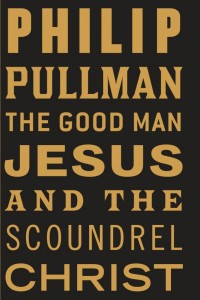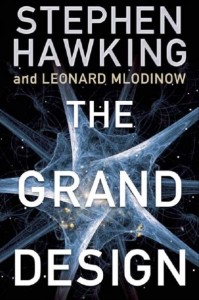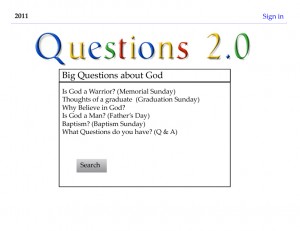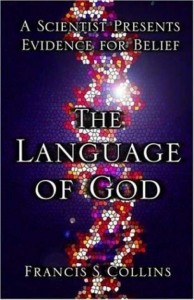Big Bang Faith – The Reverse Projection Theory
Sycamore Creek Church
April 22, 2012
Tom Arthur
Peace, Friends!
Today we continue our series on faith and science by looking at the science of psychology. Christianity and psychology have had a somewhat tumultuous relationship ever since the founding father of psychology, Sigmund Freud, wrote:
To begin with, we know that God is a father-substitute; or, more correctly, that he is an exalted father; or, yet again, that he is a copy of a father as he is seen and experienced in childhood – by individuals in their own childhood and by mankind in its prehistory as the father of the primitive and primal horde.
According to Freud, God is simply a projection of our fathers, both current and primal, upon the heavens. We want a good and powerful father, and we don’t have one, so we imagine one in the sky.
I don’t doubt that too often we project our desires for who we want God to be upon God. Too often we make God in our own image or in the image of whatever it is that we desire God to be. But just because we have a tendency to project our image upon God doesn’t rule out that we were first made in the image of God ourselves. That’s what the Bible claims:
So God created people in his own image;
God patterned them after himself;
male and female he created them.
Genesis 1:27 NLT
While Freud makes a powerful argument, I wonder if the opposite argument can’t be made. Do we at times project upon the heavens our own desire for there not to be a God? Freud himself said:
Religious ideas…are illusions, fulfillments of the oldest, strongest and most urgent wishes of mankind.
Is this not true to some extent of all our ideas? Religious or atheist? C.S. Lewis, a contemporary of Freud’s often wrote in response to the new psychology. When it comes to this idea of religion being wish fulfillment he says:
Creatures are not born with desires unless satisfaction for these desires exists. A baby feels hunger; well, there is such a thing as food. A duckling wants to swim; well, there is such a thing as water. Men feel sexual desire; well, there is such a thing as sex. If I find in myself a desire which no experience in this world can satisfy, the most probable explanation is that I was made for another world.
So is God just a projection of our wishes upon the sky? Could be. But the opposite could be true too.
All Truth Is God’s Truth
It seems that Freud wanted to put a lot of distance between faith and science. But is there no overlap? How do the science of psychology and faith work together? The wisdom of the Proverbs says:
God delights in concealing things;
scientists delight in discovering things.
Proverbs 25:2 The Message
In other words, God didn’t write a text book that explained exactly how everything works. No quantum theory text book there. It is God’s delight to hold back his cards when it comes to some things, and let people discover them. But when it comes to psychology, there is a little more overlap between faith and science. According to David Myers, a psychologist at Hope College, there are four ways that psychology and faith converge.
2. We are awesome but flawed
When it comes to our brains, we are the most complex organism the world has ever seen. And yet our brains in all their complexity are prone to judgment errors. This sounds a lot like the Bible teaching that we are fearfully and wonderfully made (Psalm 139) in the image of God, and yet all have fallen short of the glory of God and have sinned (Romans 3). Psychology and faith converge in agreement upon this point.
2. Self-serving bias
This second place of convergence between psychology and faith grows out of the first. We tend to act in self-serving ways. We ignore the needs of others around us to secure our own needs. Christianity teaches that not only do we sin, but we have a bent toward sin called original sin. We are unable not to sin. Psychology and faith converge in agreement upon this point.
3. Attitudes affect action and action affects attitudes
Psychological research has found that there is a reciprocal relationship between our attitudes and our actions. They affect one another. It’s not a one way street. Likewise, Christianity has taught that faith and works go hand in hand. Faith, our attitude toward God, affects how we live, but also what we do either grows our faith or diminishes it.
4. People and situations influence each other
The fourth place of convergence is an expansion of the third from the personal to the communal: our environment shapes us and we shape our environment. Who you spend time with and where you spend time are important decisions for the kind of person you will become. Christianity teaches that God has created a community to help us become who God has created us to become.
Critiques/Limitations of Psychology
While there are at least four if not more points of overlap between faith and psychology, there are some limitations of the science of psychology. Let’s talk about three.
1. Scientific Method vs. Psychological Method
Psychology has adopted the scientific method which is based upon the observable phenomena of objects moving and interacting with one another. But how does one observe a mental process? Using the scientific method to study phenomena that are not easily observable has some limits.
2. Not Value Neutral
More so than the physical sciences, psychology must deal with values and values are not neutral. Take for example the question, “What is healthy?” Can data answer this question? Theory has to answer this question. Theory provides a framework for interpreting data. Values of health that psychologists hold influence psychology in significant ways. You can see this in one simple way: psychologists don’t all agree on what “healthy” is.
3. Doesn’t Answer Ultimate Questions
Lastly, while psychology can shed considerable light on our lives, it cannot answer the ultimate questions. Leo Tolstoy posed these three ultimate questions: “Why should I live? Why should I do anything? Is there in life any purpose?” Psychology cannot answer these three questions, but faith does. Just to give you an example, the first question of the Westminster catechism is: what is the purpose of man? The answer is: to glorify God and enjoy him always.
Psychological Value
So what exactly is the value of psychology? First, I’ve found my own personal experience with psychology to be very helpful. I have sought out counselors several times in my life around two basic issues: relationships and emotions. When my relationship with my family has been strained, I have sought out a counselor for help. Likewise I have struggled with two emotions, anger and anxiety, that have sent me looking for some help. In all of these instances, I have found talking to a counselor helpful in giving me guidance for restoring relationships and managing emotions.
Second, the question arises for a person of faith whether to go to a counselor who is also a person of faith or someone else. My own sense is that I have always begun by seeking out a person who shares my faith, but this has not always been available to me. So I have seen both Christian and non-Christian counselors. Both were helpful, but I found meeting with Christian counselors to be more helpful. Some of this may simply be that I feel like I have less to explain and more in common. But even with Christian counselors, there are good and bad counselors. Wisdom can be found both in Christians and non-Christians, and I would seek out wisdom wherever it is to be found.
Lastly, Christianity is psychology and ministry is counseling. What we do here at SCC is itself a kind of psychology and counseling. Psychological research has shown that the more kind of social supports you have around you, the more robust you will be in dealing with psychological challenges. It turns out that going to church and being involved helps you psychologically. Practices like being in a small group provide people to talk to who may not be trained psychologists, but are people who will listen and reflect on life together. Contrary to what Freud suggests, faith isn’t a disease, “the universal obsessional neurosis,” but faith practices make you more healthy!
Conclusion
While the father of psychology had a bone to pick with religion, time has shown that psychology and faith are much more compatible than Freud was able to see. The church itself even turns out to be helpful to people’s psychological health. So how involved are you? How many opportunities are you taking to build social supports through worship and small groups? Not only will these practices help your psychological health, they’ll also help answer the ultimate questions of life:
Why should I live?
Why should I do anything?
Is there in life any purpose?







Recent Comments